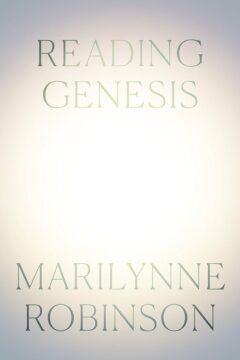Linden K. Smith at The Point:
 Robinson opens Reading Genesis with the suggestion that “the Bible is a theodicy, a meditation on the problem of evil.” For Robinson, this entails the reconciliation of “the darkest aspects of the reality we experience” with “the goodness of God and of Being itself against which this darkness stands out so sharply.” Already in the third sentence of the book, Robinson is speaking to both religious and secular readers: even if they have no interest in God, there remains the pressing question of the justification of “Being itself.” As in her fiction, Robinson is ecumenical, translating her theological outlook for the religiously alienated. She understands that theodicy is not merely a religious problem but that secular questions about the meaning and worthwhileness of life have the very same structure.
Robinson opens Reading Genesis with the suggestion that “the Bible is a theodicy, a meditation on the problem of evil.” For Robinson, this entails the reconciliation of “the darkest aspects of the reality we experience” with “the goodness of God and of Being itself against which this darkness stands out so sharply.” Already in the third sentence of the book, Robinson is speaking to both religious and secular readers: even if they have no interest in God, there remains the pressing question of the justification of “Being itself.” As in her fiction, Robinson is ecumenical, translating her theological outlook for the religiously alienated. She understands that theodicy is not merely a religious problem but that secular questions about the meaning and worthwhileness of life have the very same structure.
In Genesis, God walks the selfsame ground as God’s creatures, makes covenants with them, even bargains with them. There is nothing strange, Robinson tells us, in the fact that Genesis moves from cosmology and the origin of the universe to petty human squabbles in just a couple of chapters.
more here.
Enjoying the content on 3QD? Help keep us going by donating now.
